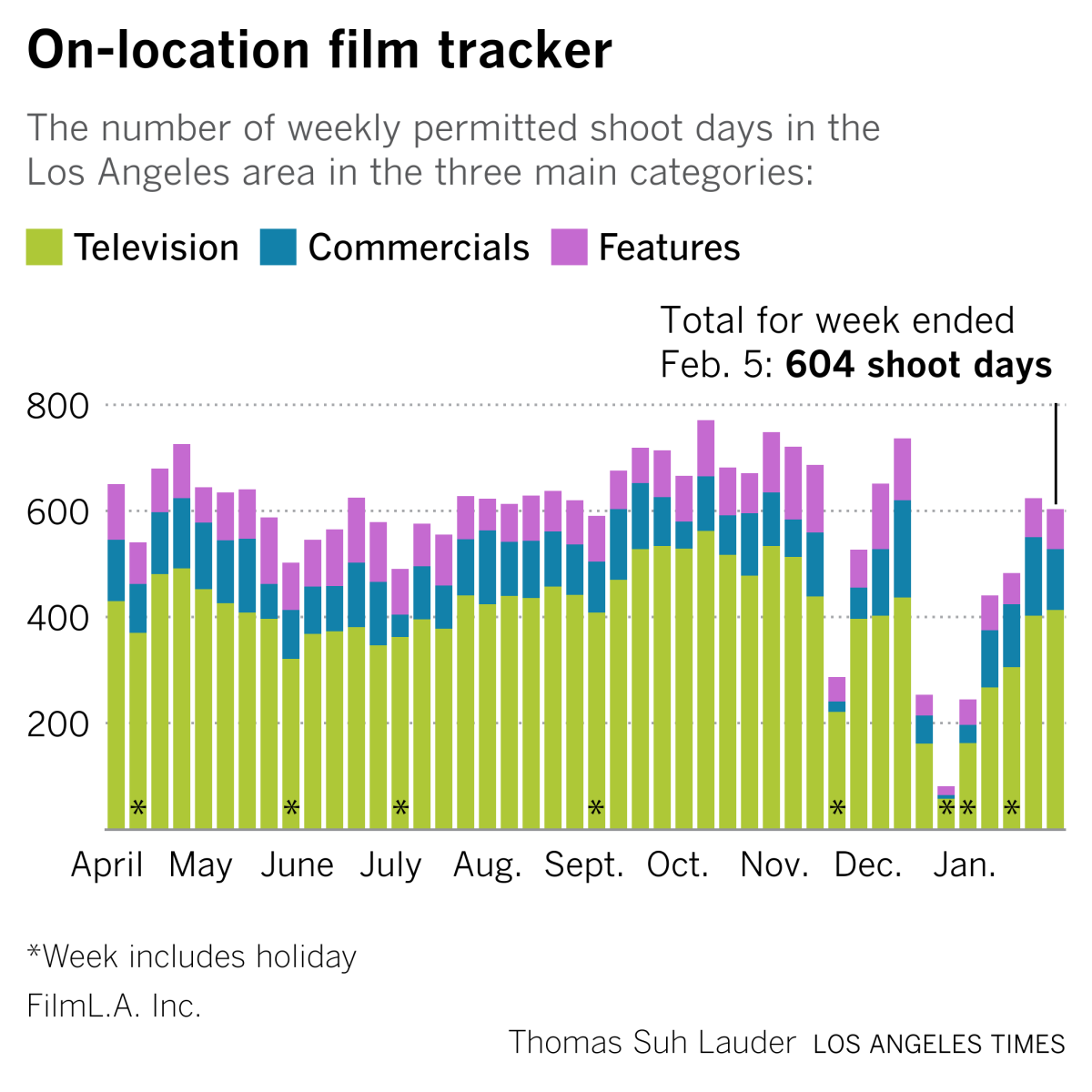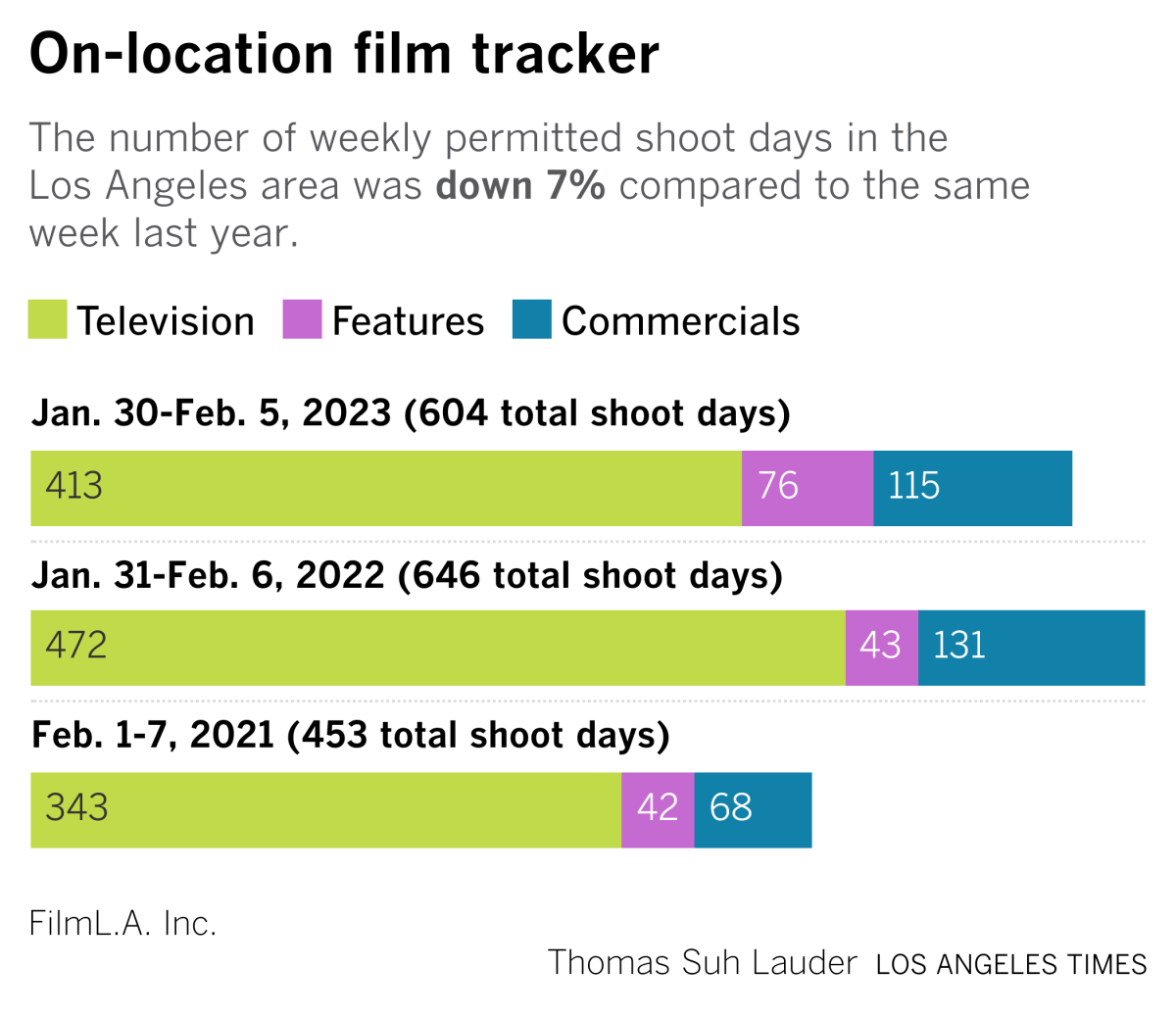‘The Chosen’ made millions in theaters. Should more TV shows get the big-screen treatment?

- Share via
Welcome to The Wide Shot, a newsletter about the business of entertainment. Sign up here to get it in your inbox.
Are older audiences back? For crowd-pleasing movies, it sure appears so. The solid $12.5-million debut for “80 for Brady” didn’t just come because theater operators agreed to lower ticket prices, though that surely didn’t hurt attendance. (Over 80 for Brady? How about over 50 and thrifty?)
This comes as Sony Pictures’ “A Man Called Otto” has quietly collected $53 million in the U.S. and Canada and after Universal Pictures’ “Ticket to Paradise” pulled in $68.3 million domestically as part of its $168-million global haul. Seems as if it was a mistake to write off the 55-plus crowd, particularly women, especially at a time when studios were putting out barely anything that appealed to older audiences.
Speaking of the cost of going to the movies, AMC Theaters unveiled its new pricing program that charges more for middle-seat tickets and less for front-row seats (if you’re in the Stubs loyalty program). Exact pricing details were not disclosed. Film Twitter people are predictably annoyed about this change, to which you might say, ever been to a concert or football game?
Anyway, here’s another way theaters might think about boosting attendance and profits.
Should studios put more TV shows in theaters?
Theaters were hard-hit last year by a movie shortage that put a damper on the box office recovery. The solution seems clear: Give theaters more material to play.
But part of the fix might not be so obvious, especially if cinema chains want to bring back patrons who haven’t been in years. What if putting TV shows in theaters could help make up the difference? Recent data suggests there’s an actual audience appetite for this so-called alternative programming.
In a survey by analytics firm the Quorum, released late last year, 77% of respondents indicated interest in seeing TV shows in movie theaters, beating out other categories including live music, video games and sporting events. Nineteen percent said they would pay more than the average movie ticket price to do so.
Even 28% of people who no longer go to movies said they’d be interested in seeing a TV show as a big-screen experience if it cost the same or more than a normal film ticket, suggesting this could be an opportunity to grow business.
The study, commissioned by the nonprofit Cinema Foundation, surveyed 5,940 people nationally between July 20 and Aug. 5, 2022, when things were about to get very dark for the box office because of the dearth of movies.
Survey results should always be taken with a grain of salt; actual consumer behavior does not always match survey responses. But there might be enough here to merit some experimentation, especially if there’s a chance that it could get non-moviegoers back in the habit.
“We want those people who are sitting on the sidelines to come back to the theater,” said David Herrin, founder of the Quorum, in an interview. “And the hope is that once they come back to the theater for not-film experiences, they will begin to remember what they love and miss about the theater, and then they will feel even more comfortable about coming back for movies as well.”
It’s not too surprising, nor is it a new idea.
Theater chains have been increasingly willing to show TV episodes, operas and NFL games. They offer to host esports tournaments and — in a true sign of impending Armageddon — corporate Zoom meetings. Fathom Events has built an entire business based on the audience demand for content other than new blockbusters.
In the latest example, one of the top 10 movies in U.S. theaters over the weekend was the season finale of “The Chosen,” a TV show about the life of Jesus.
“The Chosen” isn’t on many people’s radar in Hollywood. The series airs on the free, faith-based, family-friendly service Angel Studios, the successor to VidAngel, a Utah-based company that was successfully sued by Disney and others for illegally ripping and streaming DVDs in order to let users filter out sex, violence and swear words. It was a whole thing. (VidAngel’s filtering business lives on as a separate entity.)
Nonetheless, Fathom Events’ presentation of “The Chosen’s” two-episode Season 3 finale cracked the domestic charts at No. 9, with $3.6 million in ticket sales from nearly 2,000 screens Friday through Sunday. This comes after the season’s first two episodes, released in November, grossed $8.2 million in three days, nearly matching Searchlight Pictures’ “The Menu” during its opening. Combining its two separate releases, “The Chosen” has taken in $20 million in ticket sales.
If “The Chosen” can compete with wide-release films at the box office, should nonreligious hits, like the popular postapocalyptic video game adaptation “The Last of Us,” try to do the same?
Maybe.
Travis Clark of Insider made the case last month for more TV shows in auditoriums after seeing “The Last of Us” premiere at the Angelika Film Center in New York. “The Last of Us” is a huge hit for HBO on the small screen, with millions of people tuning in each week. With the show’s clear appeal for coveted appointment viewing, it’s worth asking if it should get the big-screen treatment as well.
Networks and TV studios understand the value of a theatrical presence of some kind.
My colleague Mary McNamara recently wrote about the star-packed premiere for “Poker Face,” a show that airs on Peacock, at the Hollywood Post 43 American Legion on Highland. HBO has put “Game of Thrones” in theaters. Paramount held theatrical screenings for “Yellowstone.” Amazon gave the first two episodes of “The Lord of the Rings: The Rings of Power” a brief cinematic push.
No box office numbers are available for “Yellowstone” or the “LOTR” prequel.
I’m still sort of skeptical.
For one thing, the success of “The Chosen” is probably a better indicator of the power of mobilizing the faith-based audience than the viability of TV shows in theaters. Plus, there’s a quality problem. People like to talk about their shows as eight-hour movies. They’re usually not, though. How many series boast the kind of production values that are well-served by a 50-foot screen?
Imax promoted and co-financed a Marvel show, “Inhumans,” as part of an experiment to fill its giant screens in the off-season for blockbusters. It flopped. The cinema technology provider has since had success with special events including livestreamed concerts.
The desire to have non-movies in movie theaters might smack of a little desperation. But exhibitors do need to adapt and think differently.
“I don’t see it as a retreat at all,” Herrin said. “I see it as an expansion.”
Stuff we wrote
— Disney proxy fight heats up as Nelson Peltz increases pressure for board seat. Disney sent a letter to shareholders imploring them not to vote for Nelson Peltz, an activist shareholder trying to gain a seat on Disney’s board.
— From Orange County to the Texas border: How Bill Melugin became a Fox News fixture. Melugin has been a constant presence on Fox News with his frequent reports on migrant crossing on the southern border. Fox’s coverage of immigration has been — how to put this? — controversial, to say the least.
— His grandma’s story charmed Tom Brady. Now it’s a Hollywood movie. A low-level staffer at a talent agency overcame the odds in pitching the story of his grandmother’s fandom, which became “80 for Brady.”
— Does Priscilla Presley have a case? Legal experts say Elvis’ ex has strong grounds in her dispute over the control of her late daughter Lisa Marie’s estate, which includes the lucrative Graceland.
— ICYMI. Ex-ABC News producer arrested on child pornography charges. Will ‘Rust’ assistant director testimony help prosecutors, or Alec Baldwin? Explaining Hollywood: How to get a job as a director. Directors Guild puts off talks with Hollywood studios in a sign of broader labor unrest. Activision Blizzard to pay $35 million to settle SEC charges on workplace disclosures.
— Agenda: On Wednesday, Bob Iger does Disney earnings for the first time since returning to the company.
Number of the week

The year of streaming and content library consolidation is underway, with Paramount Global’s decision to merge Showtime and Paramount+, effectively spelling the end of Showtime as a standalone entertainment brand.
Chris McCarthy, who leads the Showtime studio, told staff that the integration means the company will “divert investment away from areas that are underperforming and that account for less than 10% of our views.” So that naturally leads to the cancellation of shows and layoffs (goodbye, “Let the Right One In”).
Paramount CEO Bob Bakish had already signaled that McCarthy would be tasked with beefing up the Showtime franchises, by following the template he set with the “Yellowstone”-ification of Paramount+ after the company’s shortsighted decision to license the Taylor Sheridan hit western to (gulp) Peacock. For now, that means “Dexter” and “Billions” spinoffs are on the way.
This is the kind of merging that we’re going to see more of this year. HBO Max and Discovery+ are combining, in a move that Warner Bros. Discovery hopes will create a more formidable offering and save money. Why fragment your own audience with all these different channels?
Runner-up: Viewership for the Grammys came in at 12.4 million people Sunday night, according to Nielsen. That’s up 30% from last year, making it the awards ceremony’s largest audience in three years.
Actually, Peacock is cool?
A Rian Johnson show starring Natasha Lyonne. Twenty million paying subscribers. One percent of all U.S. TV viewing.
The run of positive news for Peacock has inspired a couple of interesting stories about how maybe we shouldn’t count out the NBCUniversal streaming service, which had long been thought of as a minor player versus Netflix, Disney+ and HBO Max. Puck’s Julia Alexander wrote an in-depth analysis of Comcast’s strengths and weaknesses in streaming. Vulture landed an interview with programming veteran Susan Rovner, NBCU’s TV content chief, on Peacock’s hot streak. Is Peacock finally “having a moment?” the outlet wondered.
Having a couple hit shows is certainly something to celebrate. But the unit did lose nearly $1 billion in the most recent quarter, with a “peak” of $3 billion in annual losses projected for this year. The company just ended sign-ups for its free version in order to focus on subscriptions.
Best of the web
— How the documentary/docuseries boom tests ethical standards of the form. (Vulture)
— What Andrea Riseborough’s controversial nomination reveals about the Oscars. (Vox)
— Universal Music tries to overhaul the streaming model. (FT)
— Leading YouTuber defends himself after a video in which he said he was “curing” 1,000 blind people goes sideways in predictable fashion. (Insider)
— Why this former Bachelorette-turned-aspiring comedian traded love for laughs. (L.A. Times)
— Jeffrey Katzenberg’s escape to L.A. politics. (Politico)
— Salman Rushdie speaks for the first time since his near-fatal stabbing. (New Yorker)
Film shoots
On-location filming in Los Angeles continues to lag behind 2022 levels, according to data from FilmLA.


Finally ...
This newsletter was written to the sounds of Samara Joy, the young jazz singer who just won the Grammy for best new artist.
The Wide Shot is going to Sundance!
We’re sending daily dispatches from Park City throughout the festival’s first weekend. Sign up here for all things Sundance, plus a regular diet of news, analysis and insights on the business of Hollywood, from streaming wars to production.
You may occasionally receive promotional content from the Los Angeles Times.




